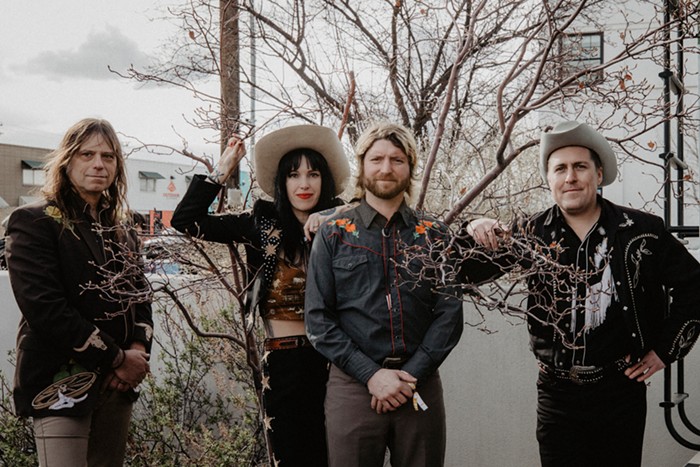WHEN IT COMES to the history of rock 'n' roll and the rise of heavy metal, Girlschool couldn't have emerged at a better time, or from a better corner of the world. They got their start in England in the late '70s, and the New Wave of British Heavy Metal (NWOBHM) was in full swing. Bass player Enid Williams recalls that time.
"We were in our late teens, early 20s in that period. We'd grown up with Sabbath, Zeppelin, and Purple. Then of course punk came along in '76, '77. The energy of punk really blew everything apart. There was a lot of rubbish music at that time and [punk] kind of stirred things up."
Nascent metal bands began to take the riffs of harder-edged rock 'n' roll, speed them up, and inject them with a bit of punk attitude. The result was fast, mean, snarling music, and Girlschool's sound fit right in with the ever-growing pack. At the end of 1978, they released their first single, "Take It All Away." From there, Girlschool's success grew with the help of infamous British disc jockey John Peel, who gave their first single air time, and with early collaborations with fellow English juggernauts Motörhead. Subsequent albums were as blistering and tough as anyone else in NWOBHM. Because they were women, though, Girlschool were often set apart from their peers.
"We just wanted to copy our heroes, hit the road, play music, and have a good time like guys did," says Williams. "We didn't see anything strange about it. The reason we formed an all-female band in the first place was because we went to an all-female school, and none of the boys in the youth club wanted to play with us."
Thankfully, Williams is a good sport about answering the obvious questions. When asked if Girlschool got a lot of grief or second-guessing because they were a band of ladies, she says, very decidedly, "Yeah."
"You could probably get away with calling us women, by nature of the name 'Girl,' but I don't think there's any ladies in the band," Williams adds, laughing heartily.
She then proceeds to revisit stories of moronic security guards trying to boot them before a Uriah Heep show, thinking they were groupies who snuck in, and not the opening act waiting to do their soundcheck. She also remembers some horrible journalists who gave their fathers credit for forming the band.
"It's very easy to credit men. Women do it themselves, as well," Williams says.
You'd think those days are ancient history. After the riot grrrl movement and countless bands over the years—heavy and otherwise—that were made up of women, everyone would be okay with bands like Girlschool kicking it down. But according to Williams, they still run into promoters and other people on the business side with hangups.
"The '70s were a long time ago. The attitudes were quite different, but there are lots of problems now. In some ways things haven't improved," she says. "A few years ago, we wanted to play a festival in Scandinavia. We'd played there before and gone down like a storm. Our manager tried to get us on the bill, and they turned 'round and said, 'Well, we've already got a female band.' I mean, this is Scandinavia! One of the most egalitarian parts of the world! What do you have to do to change this attitude?!"
Gender is not a gimmick. The reason Girlschool is the longest running all-female rock 'n' roll band is because they play rock 'n' roll well. It has nothing to do with what's swinging between their legs.
Years, even decades, after many of their fellow NWOBHM bands have fallen by the wayside, Girlschool are going strong. On this tour they will be selling an exclusive EP with a few songs from their forthcoming full-length, and a cover of the Bee Gees classic "Staying Alive." While that may seem an odd song for a hard-charging rock act, it's an apt choice for Girlschool—it sums up their fighting attitude perfectly.



















